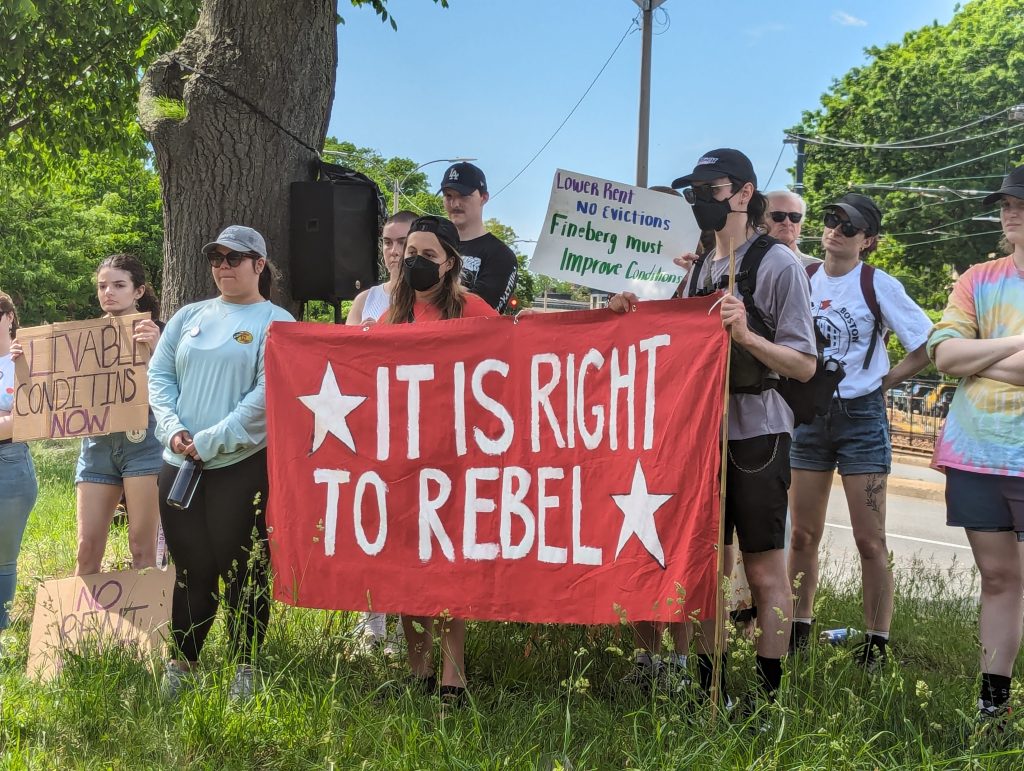By Liam MacLean
BOSTON — Tenants and supporters gathered on Saturday outside of an apartment building in Allston-Brighton to protest the refusal of their landlord, Fineberg Management, to engage in collective bargaining with the tenants.
“We are standing up together because individually, divided, the best we can do is beg. But together, we collectively bargain,” said Dan Albright of the Fineberg Tenants Union (FTU) and DSA.
The protest was organized by the FTU with support from the Greater Boston Tenant Union (GBTU) and called attention to the continuous and arbitrary rent increases imposed by Fineberg on an annual basis.
“What’s happening to our community is death by a thousand cuts,” continued Dan, noting how the consistent increase of rents by smaller increments is forcing working class residents out of Allston-Brighton.
Fineberg has recently increased the rent across its properties by around 5% according to FTU, following last year’s increase of around 10-20% according to Dan. As a result of these increases, around 150 Fineberg renters organized with the FTU presented Fineberg Management with a request to bargain, which Fineberg has so far ignored according to FTU.
Tenants Zak Brustman and Isabella Nuño also noted that Fineberg Management, like many Boston area landlords, have consistently provided units in a state of disrepair, including a rotted kitchen floor and blocked fire escapes.
“When we moved into our apartment, we found that… the kitchen sink had been leaking for so long that it had rusted through the cabinet below it and the floor beneath was rotting and waterlogged, and that access to the fire escape was blocked by metal bars that had been placed over the window,” Zak said. They added that “when someone from maintenance came to fix the issue, he had been instructed by management to cover the rotten and rusted hole with a piece of plastic, to hide the issue, instead of fixing the leak itself.”
Mary, another speaker at the rally, recounted her experiences with another big landlord: Alpha Management. She spoke of living in an apartment with rotten floorboards and how she was later forced to leave in retaliation for attempting to organize tenants in her building.
The protest also had speakers from Boston DSA, City Life/Vida Urbana, and Mass Struggle. All expressed hope that through organizing, tenants would be able to exercise their collective power and rein in high rents and poor living conditions.
Rental costs are an issue throughout Boston, which has become some of the most expensive in the United States. Even Allston-Brighton, which remains one of the cheapest neighborhoods in Boston, has seen a huge leap in rental costs over the last 10 years. This is even as many tenants continue to complain of major housing code violations that are ignored by the landlord, even when the tenant reaches out to request repairs.
GBTU has focused much of its work on attempts to build tenant power from below, primarily by creating bargaining units that are capable of collective action against landlords with demands such as necessary repairs or lower rents. The organization grew out of pushes for an eviction moratorium during COVID and has since shifted focus to fighting poor conditions and high rents.
This organizing is often done against enormous odds. Unlike labor organizing, which won some protections during the 20th century, tenants unions have comparatively minimal legal recourse. In one case in 2022, which was ultimately dismissed, a Boston landlord attempted to sue a Tufts student journalist for libel over an article covering a tenant union protest.
The vast majority of existing tenant protection treats the tenant as an individual in a contract with the landlord. That means that it covers individual incidents, such as seized security deposits or major code violations — though often even these cases never get reported as tenants are often afraid of retaliation. Issues related to tenant collective bargaining have almost no legal protection however, meaning that while occasionally a single tenant is able to successfully bring their landlord to justice, on the larger scale there is very little opportunity for tenants to flex their collective power and challenge the property owning classes in major ways. Through organizing and collective bargaining, this power imbalance can be flipped around.
A limited rent control measure from Boston Mayor Michelle Wu has largely stalled in the state legislature. And even i Democrats were to pass this home rule petition,it only caps rent increases at around 10% annually, while doing nothing to address already out-o-control current prices. Wu’s other programs, including more affordable units in new buildings and expanded public housing may help, but have yet to bear much fruit. In either case, they fail to challenge the fundamental issue at the heart of Boston’s housing crisis: as long as homes are a vector for profit-making, these issues will continue.

